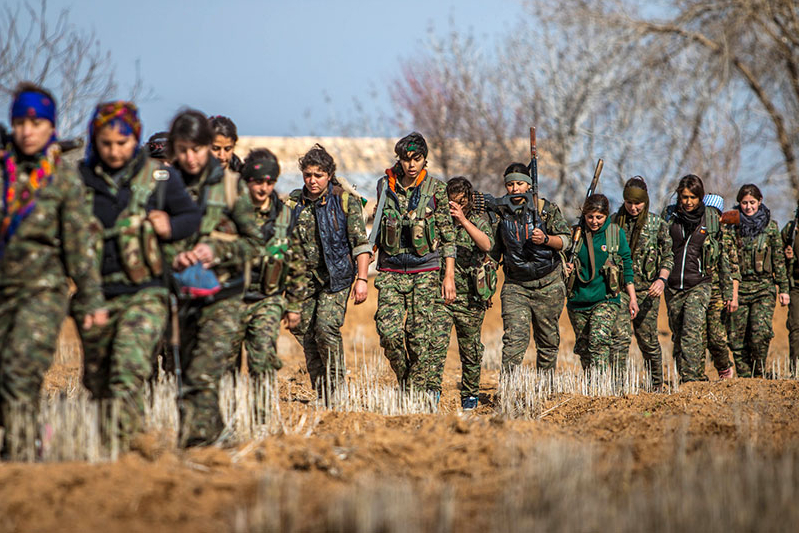
The Kurds have successfully beaten back the terror group known as ISIS in both Iraq and Syria, most recently in the Syrian border city of Tal Abyad. However, in their fight, the Kurdish people also have a larger controversial goal in mind: to form a new nation.
According to Lucy Kafanov of USA Today, Syrian Kurdish forces called the YPG have pushed back ISIS militants from Tal Abyad. Some residents of the town felt uneasy with the YPG in the area, even though they previously lived under harsh Islamic rules set by the terror group.
"I am happy that they are gone, but I don't know if things will be better under the YPG," Isam, one of more than 23,000 Syrian refugees who fled to Turkey, said. "I didn't enjoy living under the Islamic State, but I wasn't afraid because there was no trouble as long as you followed the rules. With the Kurds, there is only uncertainty."
Kafanov reported that the victory of YPG and its Syrian rebel allies, with help from the U.S.-led coalition air strikes, have deprived ISIS "of a critical route for smuggling weapons, supplies and fighters into Syria." White House spokesman Josh Earnest described those efforts last week as a "recipe for success."
"It is an indication that when our coalition can back capable, effective, local fighters on the ground, that we can make important progress against ISIL," Earnest said.
However, Karl Vick of Time pointed out that the Kurds have fought so well because they wanted "a country of their own." He noted that even though the Kurds have a population of 30 million worldwide, they never had a nation despite having a shared language, culture and identity.
"In Iraq, Kurdish forces armed by both Iran and the U.S. have taken perhaps 10,000 square miles from ISIS since last fall," Vick wrote. "They also snapped up the disputed city of Kirkuk, rich in oil and cultural significance to Kurds and Arabs alike-and are preventing Arabs from returning to some villages."
Denise Natali, a senior research fellow at National Defense University in Washington, warned that the fight against ISIS, particularly in Iraq, has helped fuel "Kurdish land grabs" as Iraqi Kurds "act as coalition boots on the ground."
"Iraqi Kurds are using U.S. airstrikes and the political vacuum in northern Iraq not only to push back ISIS, but also to recapture disputed territories and oil fields-some of the very measures that have fueled Sunni Arab resentment since 2003," Natali wrote.
Michael Stevens, director of the Royal United Services Institute in Qatar, told USA Today that the Middle East is currently in "an extremely fragile situation" due to the diversity of the region.
"You're dealing with a multiethnic region where ethnic and social tensions are strained by the Kurds' rapid expansion," Stephens said. "The reality is that economy, security and trade are now completely in the hands of the Kurds."
According to Kafanov, the United States has been placed in a difficult position in regards to helping the Kurds fight ISIS. That's because the country does want to offend Turkey, a key NATO ally that has a sizable Kurdish minority population.
"Syrian Kurdistan is a reality on the ground - there's no going back," Stephens said. "What makes Tal Abyad so important is it establishes the fact that Syria as a country is finished. It's not quite a death knell, but Syria has permanently changed and will never go back to the way it was before 2011."
Vick reported that the Kurds in Iraq have previously tried to establish their own influence and power during the 2003 U.S.-led invasion, which led to the fall of Saddam Hussein. Back then, the Kurds took over the oil-rich city of Kirkuk with "garbage trucks and street cleaners."
"The idea was to start providing essential government services to the oil-rich city, which is also claimed by Iraq's Sunni population, and thereby assume control in the softest possible manner," Vick wrote. "Kurdish leaders wanted everyone on their best behavior."
However, Vick pointed out that U.S. forces kicked out the garbage trucks, which made the Kurds rely on other methods. After ISIS tried to take over Kirkuk, the Kurds occupied that city and plan to hold it despite Arab claims to the territory.
"We have to be careful that in our pushing back ISIS, we are not setting the stage for the next conflict," Natali said.
Syria expert Aron Lund of the Carnegie Endowment for International Peace told USA Today that Syrian Kurds would have to balance out tampering ethnic tensions and restraining their separatist ambitions, noting that declaring an independent state right now would be "political suicide."
"This is a group that could conceivably negotiate what the future of Syria will look like," Lund said of the Kurds. "They need to maintain legitimacy and political cover in order to hold their areas, which means avoiding an all-out Arab-Kurdish conflict, while continuing to attack the Islamic State to maintain U.S. political support."
For now, though, residents remained skeptical of change thanks to the political instability, whether it comes from ISIS, the Kurds, or the Free Syrian Army. Many attended to more pressing needs.
"There is no difference between the regime, FSA, ISIS or the Kurds," 38-year-old Syrian day laborer Nasser Abraham said. "They fight over power, religion and democracy, while we can't even support our children or put food on the table. I will return to Tal Abyad when our dignity is restored and not before."







